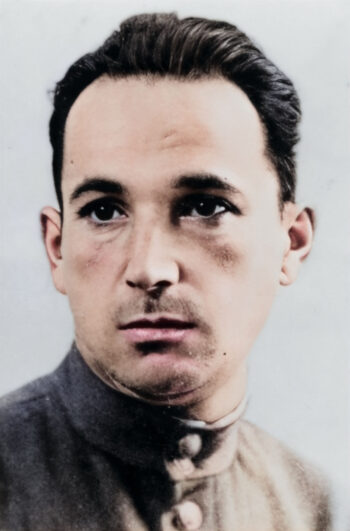Pechersky, Alexander

Alexander Pechersky (22 Feb. 1909 – 19 Jan. 1990), a Soviet-soldier of the Red Army, ended up in German captivity in 1941. After an extended stay at a labor camp in Minsk, he ended up at the Sobibór Camp in September of 1943, where he organized a successful prisoner uprising just three weeks later, on 14 October. He therefore is one of the stars of the orthodox Holocaust narrative and the protagonist of a number of movies about the uprising.
In 1945, a report about his experiences while in German captivity was published in the Soviet Union, with an extended version of it appearing in 1946 in Yiddish titled Revolt in Sobibór. Pechersky’s report is full of outrageous lies, the most striking of which are:
- He claimed that some other inmate told him that every day (or every other day in the extended version) 2,000 deportees were exterminated, with the camp already having existed for nearly a year and a half, which would amount to (500 days × 1,000 or 2,000 =) at least half a million, a number he elsewhere explicitly claims as the total death toll. This stands against some 200,000 victims claimed by today’s orthodoxy. Moreover, trains going to Sobibór are rather well-documented, and there were only relatively few trains going to Sobibór in 1943 – none between 21 July and 14 September, and only a handful after Pechersky’s arrival. Therefore, either he was told bold lies by his co-inmates, or he unscrupulously invented things.
- He claimed to have heard from a fellow inmate that the bath (evidently only one room) was equipped with “faucets for hot and cold water” and even with a “basin to wash in.” However, the orthodoxy insists that those gas chambers were plain rooms with no accoutrements.
- Mass murder at Sobibór was presumably carried out with some bizarre “thick dark substance” coming down spiraling from holes in the roof of the death chamber (his 1945 manuscript has here simply “black gas”). However, mainstream historians insist that it was done using engine-exhaust gases.
- The gassing was observed by an SS man through a roof window. That is rejected by the orthodoxy as false.
- After the murder, the floors opened, and the bodies were discharged into carts below, which brought them to mass graves. According to the current orthodox narrative, however, no collapsible floors with carts underneath existed. The corpses were instead taken out of the chamber manually, sideways through a normal door.
- When he was interrogated again in 1961, probably in the context of the Eichmann Trial, he sanitized his account by eliminating everything not in line with the orthodox narrative – except for the wash basins, which he kept.
- Whenever people were led into the death chamber, a gaggle of 300 geese kept in the camp were made to honk and shriek loudly, so the victims’ cries could not be heard.
- Pechersky befriended an 18-year-old German Jewish girl who spoke only German and Dutch and was kept alive for some inscrutable reason. They allegedly had extensive conversations in private, although Pechersky only spoke Russian. Therefore, all these conversations are made up as well.
- After his escape from Sobibór, Pechersky learned of a German camp nearby “where people were turned into soap.”
- Pechersky told his tale of how the uprising unfolded, with all SS guards behaving friendly, naïve, unsuspecting, trusting and relaxed before getting butchered one by one by the scheming inmates. The SS men’s claimed behavior is inconceivable if they were indeed guarding an extermination camp, in which no inmate could be trusted (and vice versa no guard), unless they were not guarding an extermination camp.
- Pechersky claimed that every night the guards had to hand in the clip of five cartridges which came with the rifle each of them had been issued. In a real extermination camp, however, where an inmate revolt had to be expected at any time, the camp administration would have made sure that all guards remained constantly armed to the teeth.
The last point can be complemented by a statement made by the former police captain Erich Wullbrandt in Braunschweig, Germany, in 1961. According to him, some of the Jews who had escaped during the revolt returned voluntarily to the camp the next night. Had Sobibór been an extermination camp, that would have been utterly inconceivable.
(See the entry on Sobibór for more details, as well as Graf/Kues/Mattogno 2020, pp. 69f., 84-93; Mattogno 2021e, pp. 82-84.)

You need to be a registered user, logged into your account, and your comment must comply with our Acceptable Use Policy, for your comment to get published. (Click here to log in or register.)